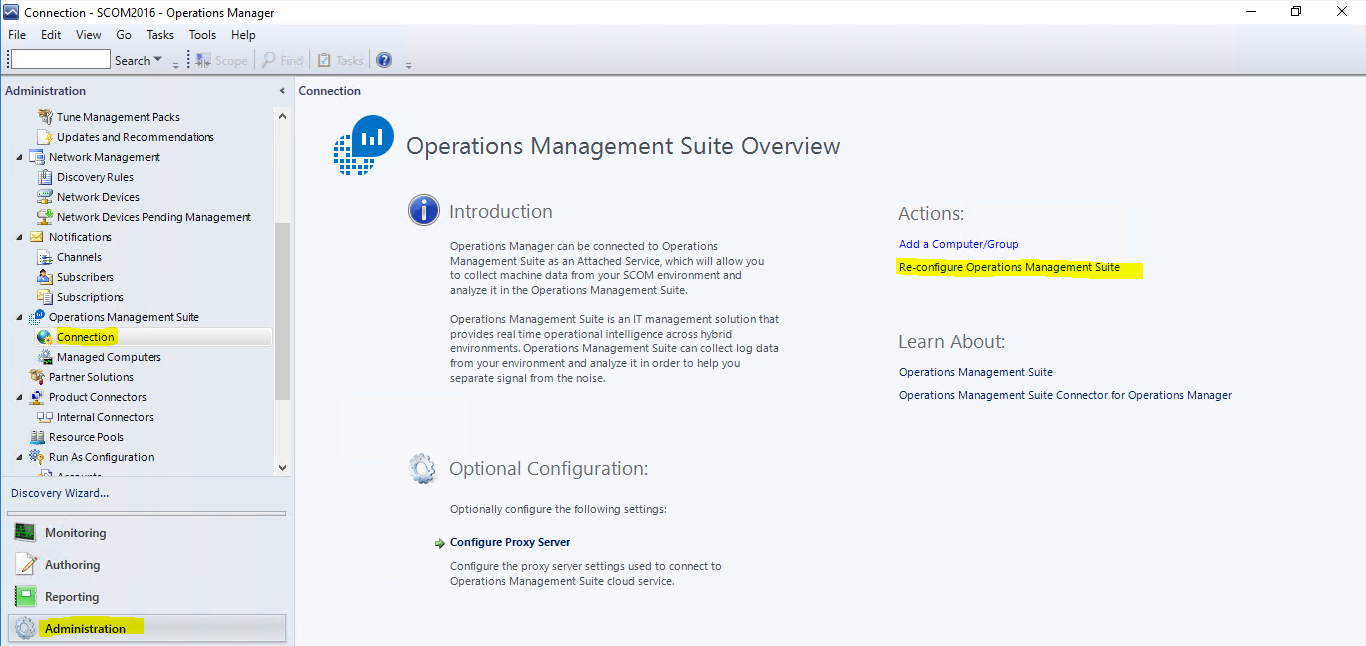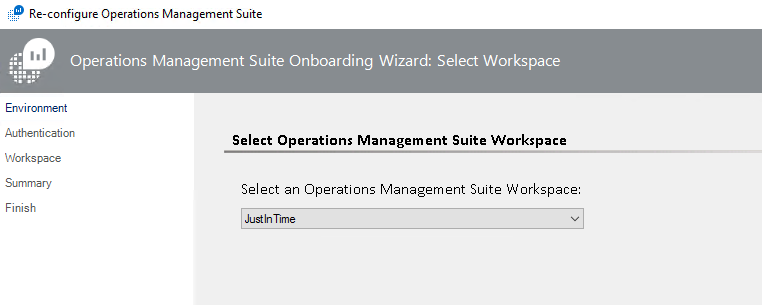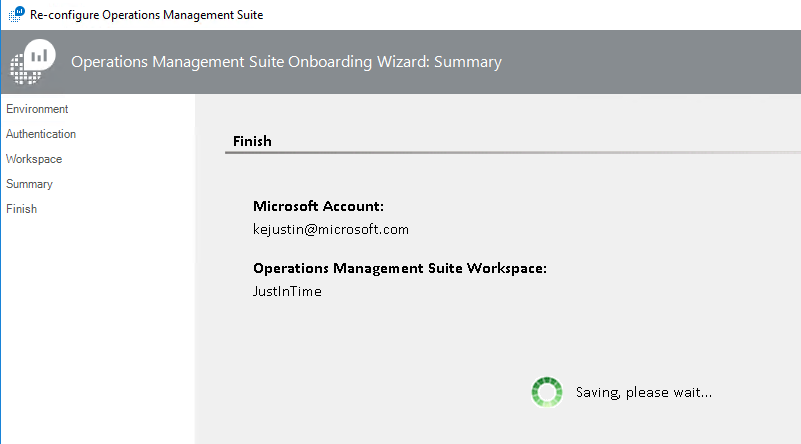OMS/Advisor Event ID 55002

This article is written for the Gateway CommunicationSecurityException event
At first I thought maybe this was TLS1.2 enabling, but backed off the change, the events kept pouring in every 5 minutes.
Tried to reconfigure the OMS/Advisor environment, and voila! Error resolved
Let's go through the steps to re-configure the Operations Management Suite (OMS) in SCOM
Reconfigure OMS
- From the SCOM Console, click on Administration tab
- Expand Operations Management Suite (Advisor on 2012R2)
- Click on the Connection
- On the center pane, click on Re-configure Operations Management Suite

5. Add any trusted sites to IE if there are pop-ups
I had 2 missing websites
Secure.aadcdn.microsoftonline-p.com
az416426.vo.msecnd.net
( I hit Previous and next to verify the wizard would pass with the hopes the attempt would retry)
6. Exit the Reconfigure wizard to get a retry (then the second website popped up as an untrusted site)
7. Enter credentials to your OMS environment
Connection to OMS successful 
Click Next twice
Reconfigure success

Click Close
Verify Event Log
Verify Operations Manager Event Log has no new events (this check runs every 5 minutes by default)
get-eventlog -logname "Operations Manager" | ? { $_.EventID -match 55002 } | select-object -last 2
Event ID 55002 from Operations Manager Event Log
Log Name: Operations Manager
Source: Advisor
Date: 12/11/2017 2:15:20 PM
Event ID: 55002
Task Category: None
Level: Warning
Keywords: Classic
User: N/A
Computer: 16MS01.testlab.net
Description:
Failed to synchronize the latest Management Package information from Advisor Cloud service. Wait for the next cycle to retry. Reason: Microsoft.SystemCenter.Advisor.Common.WebService.GatewayCommunicationSecurityException: Message security was invalid for the connection with web service when performing Get Intelligence Packs with client specified versions ---> System.ServiceModel.Security.MessageSecurityException: An unsecured or incorrectly secured fault was received from the other party. See the inner FaultException for the fault code and detail. ---> System.ServiceModel.FaultException: ID3242: The security token could not be authenticated or authorized.
--- End of inner exception stack trace ---
Server stack trace:
at System.ServiceModel.Channels.SecurityChannelFactory`1.SecurityRequestChannel.ProcessReply(Message reply, SecurityProtocolCorrelationState correlationState, TimeSpan timeout)
at System.ServiceModel.Channels.SecurityChannelFactory`1.SecurityRequestChannel.Request(Message message, TimeSpan timeout)
at System.ServiceModel.Dispatcher.RequestChannelBinder.Request(Message message, TimeSpan timeout)
at System.ServiceModel.Channels.ServiceChannel.Call(String action, Boolean oneway, ProxyOperationRuntime operation, Object[] ins, Object[] outs, TimeSpan timeout)
at System.ServiceModel.Channels.ServiceChannel.Request(Message message, TimeSpan timeout)
Exception rethrown at [0]:
at System.ServiceModel.Security.IssuanceTokenProviderBase`1.DoNegotiation(TimeSpan timeout)
at System.ServiceModel.Security.IssuanceTokenProviderBase`1.GetTokenCore(TimeSpan timeout)
at System.IdentityModel.Selectors.SecurityTokenProvider.GetToken(TimeSpan timeout)
at System.ServiceModel.Security.Tokens.IssuedSecurityTokenProvider.GetTokenCore(TimeSpan timeout)
at System.IdentityModel.Selectors.SecurityTokenProvider.GetToken(TimeSpan timeout)
at System.ServiceModel.Security.SecurityProtocol.TryGetSupportingTokens(SecurityProtocolFactory factory, EndpointAddress target, Uri via, Message message, TimeSpan timeout, Boolean isBlockingCall, IList`1& supportingTokens)
at System.ServiceModel.Security.TransportSecurityProtocol.SecureOutgoingMessageAtInitiator(Message& message, String actor, TimeSpan timeout)
at System.ServiceModel.Security.TransportSecurityProtocol.SecureOutgoingMessage(Message& message, TimeSpan timeout)
at System.ServiceModel.Security.SecurityProtocol.SecureOutgoingMessage(Message& message, TimeSpan timeout, SecurityProtocolCorrelationState correlationState)
at System.ServiceModel.Channels.SecurityChannelFactory`1.SecurityRequestChannel.Request(Message message, TimeSpan timeout)
at System.ServiceModel.Dispatcher.RequestChannelBinder.Request(Message message, TimeSpan timeout)
at System.ServiceModel.Channels.ServiceChannel.Call(String action, Boolean oneway, ProxyOperationRuntime operation, Object[] ins, Object[] outs, TimeSpan timeout)
at System.ServiceModel.Channels.ServiceChannelProxy.InvokeService(IMethodCallMessage methodCall, ProxyOperationRuntime operation)
at System.ServiceModel.Channels.ServiceChannelProxy.Invoke(IMessage message)
Exception rethrown at [1]:
at System.Runtime.Remoting.Proxies.RealProxy.HandleReturnMessage(IMessage reqMsg, IMessage retMsg)
at System.Runtime.Remoting.Proxies.RealProxy.PrivateInvoke(MessageData& msgData, Int32 type)
at Microsoft.AttachedServices.WebService.IIntelligenceService.GetIntelligencePacksInfo(ClientProperties clientProperties)
at Microsoft.SystemCenter.Advisor.Core.WebService.WebServiceCallHelper.CallWebService[T](Func`1 webServiceCall, String webServiceDescription)
--- End of inner exception stack trace ---
at Microsoft.SystemCenter.Advisor.Core.WebService.IntelligenceServiceClient.CallWebServiceWithRetry[T](Func`2 function)
at Microsoft.SystemCenter.Advisor.Core.WebService.IntelligenceServiceClient.GetIntelligencePacksInfo(ClientProperties clientProperties)
at Microsoft.SystemCenter.Advisor.Core.IntelligencePackWriteAction.UpdateIntelligencePacks()